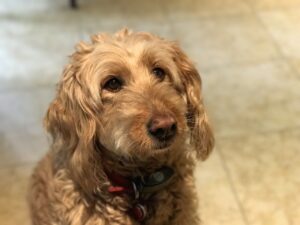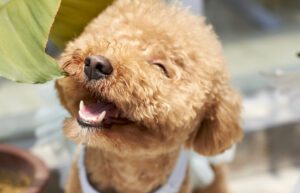Are you looking for the perfect dog that is small in size but big on personality? Look no further than the mini Goldendoodle! This adorable breed is a cross between a Golden Retriever and a Miniature Poodle, resulting in a compact puppy that is also a great family dog. With its toy poodle genes, this furry companion is sure to steal your heart.
Mini Goldendoodles, a crossbreed of poodle mixes, typically weigh between 15 to 35 pounds and stand 13 to 20 inches tall. Their curly coats can range in color from cream to red, requiring regular grooming to keep them looking their best. But don’t let their hair fool you – these pups are known for their friendly and affectionate personalities, making them the perfect dog for families. If you’re looking for a larger dog, consider a standard poodle mix like the Goldendoodle!
If you’re considering adding a mini Goldendoodle to your household as a family dog, you may be wondering about their size, weight, and grooming needs. Fear not! We’ll cover all of that and more in this comprehensive guide. Mini Goldendoodles are poodle mixes and typically weigh between 15-35 pounds. They are smaller than the standard poodle but still larger than some other small dog breeds. When it comes to grooming, their coats require regular brushing and trimming to prevent matting. So sit back, relax, and get ready to fall in love with this adorable and loving large dog breed.
Pros and Cons of Owning a Mini Goldendoodle
Advantages of owning a Mini Goldendoodle:
- Hypoallergenic coat
- One of the most significant advantages of owning a Mini Goldendoodle puppy, a crossbreed between a Golden Retriever and a Poodle, is their hypoallergenic coat. This feature makes them an excellent choice for owners with allergies or asthma, as they produce less dander and shed less hair than other breeds. Additionally, finding a reputable Mini Goldendoodle breeder who specializes in this unique crossbreed can ensure that you are getting a high-quality puppy with the desired traits. This means that they are less likely to trigger allergic reactions in sensitive individuals.
- Intelligent and easy to train
- Another advantage of owning a Mini Goldendoodle puppy is their intelligence and trainability. They are quick learners, making them ideal for families who want a dog that can easily adapt to their lifestyle. They respond well to positive reinforcement techniques and enjoy learning new things, which makes training them enjoyable for both the owner and the dog. When looking for a breeder, it’s important to find one who adheres to the breed standard, ensuring that your poodle mix puppy will have the best possible traits from both breeds.
- Friendly and affectionate personality
- Mini Goldendoodles, a crossbreed of a Golden Retriever and a Poodle, have a friendly and affectionate personality, which makes them great companions for people of all ages. They love being around people, especially children, and thrive on human attention. As a result, they are highly sought-after as puppies from reputable breeders. They are also known for being loyal dogs that form strong bonds with their owners.
Cons of owning a Mini Goldendoodle:
- Regular grooming required
- One of the biggest downsides to owning a Mini Goldendoodle puppy, a crossbreed between a Golden Retriever and a Poodle, is that they require regular grooming to maintain their coat’s health and appearance. Their curly fur, inherited from the Poodle parent, can quickly become matted if not brushed regularly, which can be time-consuming and expensive if done by professional groomers. It is important to find a reputable breeder when looking for a Mini Goldendoodle puppy to ensure they are healthy and well-bred.
- Separation anxiety
- Another potential downside to owning this crossbreed is that they may suffer from separation anxiety if left alone for long periods of time. This condition can lead to destructive behavior such as chewing furniture or digging holes in the yard. If you are considering getting a mini groodle, it’s important to find a reputable breeder who specializes in breeding this particular mix.
- Health issues
- Like many purebred dogs, Mini Goldendoodles, which are a result of breeding a Golden Retriever and a Poodle, may be prone to certain health issues such as hip dysplasia and eye problems. These conditions can be costly to treat and may require frequent visits to the vet, especially during the puppy stage.

How to groom a Mini Goldendoodle:
Grooming a Mini Goldendoodle puppy, which is a crossbreed between a Golden Retriever and a Poodle, requires regular brushing, bathing, and trimming. Breeding this type of dog results in a unique coat that needs special attention to keep it looking healthy. Here are some tips on how to maintain your Poodle mix’s coat.
- Brush their fur regularly
- Use a slicker brush or comb to remove any tangles or mats in the fur of your mini poodle, golden doodles, mini groodles, or goldendoodle mini. Brush them at least once a week, more frequently if they have longer hair.
- Bathe them when needed
- Bathing your Mini Goldendoodle puppy too often can strip their coat of its natural oils, so it’s best to bathe them only when necessary. Use a mild shampoo designed for dogs, especially poodles, and rinse thoroughly.
- Trim their hair
- If you have a poodle, puppy, mini groodles, or an Australian Goldendoodle and prefer a shorter haircut, consider taking them to a professional groomer every few months for a trim. This will help prevent matting and make grooming easier between appointments.
Miniature vs Standard Goldendoodles: Which is the Best for You?
What are Miniature and Standard Goldendoodles?
Goldendoodles are a popular breed of puppy dogs that are known for their friendly and affectionate nature. They are a cross between a Golden Retriever and a Poodle, and come in different sizes, including miniature and standard. Miniature Goldendoodles are smaller in size compared to Standard Goldendoodles. They are usually bred by crossing a Miniature Poodle with a Golden Retriever, while Standard Goldendoodles are bred from a Standard Poodle and a Golden Retriever.
Size Matters
One of the most significant differences between Miniature and Standard Goldendoodles is their size. As mentioned earlier, Miniature Goldendoodles are smaller in size, weighing between 15-35 pounds when fully grown. Poodle genes play a role in determining the size of a Goldendoodle puppy. On the other hand, Standard Goldendoodles can weigh anywhere from 50-90 pounds when fully grown.
Miniature Goldendoodles are ideal for those who live in apartments or have limited space because they require less room to move around. They also make great travel companions due to their small size. However, if you have more space available, then you may want to consider getting a Standard Goldendoodle instead. Both Miniature and Standard Goldendoodles are a mix between a Golden Retriever and a Poodle, making them hypoallergenic and great for those with allergies.

Handling
Another factor to consider when choosing between Miniature and Standard Goldendoodles is how easy they are to handle. Due to their small size, Miniature Goldendoodles are easier to manage than their larger counterparts. They can be easily carried around or taken on walks without much effort. Poodles, however, require a bit more attention due to their curly hair that needs regular grooming.
On the other hand, handling a Standard Goldendoodle can be quite challenging due to its large size and weight. If you have children or elderly people at home who may struggle with handling such an active dog breed, then it’s best to opt for the smaller-sized Miniature Goldendoodle. However, if you’re looking for a dog breed that has more poodle characteristics, then the Standard Goldendoodle may be the better choice for you.
Temperament & Personality
Both Miniature and Standard Goldendoodles, which are a crossbreed between a Golden Retriever and a Poodle, are quite similar. They are known for their friendly, outgoing nature and make great family pets. They are also highly intelligent and easy to train due to the Poodle’s influence in their genetics.
However, Standard Goldendoodles may be a better choice due to their larger size and sturdier build. They can handle rough play better than the delicate Miniature Goldendoodle. Additionally, their Poodle ancestry gives them a hypoallergenic coat, making them a great option for those with allergies.
8 Important Things to Know About the Miniature Goldendoodle Breed
Crossbreed of Golden Retriever and Miniature Poodle
Miniature Goldendoodles are a popular crossbreed between a purebred Golden Retriever and a Miniature Poodle. This breed is also known as “Mini Goldendoodles” or “Toy Goldendoodles.” They are bred to have the best characteristics of both parent breeds, such as intelligence, loyalty, and friendliness.
No Breed Standard for Miniature Goldendoodles
Unlike their American Golden Retriever ancestors, there is no breed standard for Miniature Goldendoodles, which are a crossbreed between a Golden Retriever and a Poodle. This means that they do not have specific guidelines on how they should look, act, or behave. As a result, their appearance and temperament can vary depending on factors such as genetics and upbringing.

Smaller in Size Compared to Purebred Golden Retrievers
Miniature Goldendoodles are smaller in size compared to their purebred Golden Retriever ancestors. They usually measure around 13-20 inches tall when fully grown and weigh between 15-35 pounds. This makes them an ideal pet for those who prefer small dogs but still want the friendly nature of Golden Retrievers.
Regular Grooming Required for Curly Hair
One of the most distinct features of Miniature Goldendoodles is their curly hair. While this coat type adds to their adorable appearance, it requires regular grooming to prevent matting and tangling. Owners must brush their dog’s hair at least once a week to keep it healthy and shiny.
Similar Lifespan as Other Small Dog Breeds
The lifespan of Miniature Goldendoodles ranges from 10-15 years, which is similar to other small dog breeds. However, like all living creatures, this lifespan can be affected by various factors such as diet, exercise levels, genetics, and overall health care.
Inherited Traits from Both Parent Breeds
Miniature Goldendoodles inherit traits from both parent breeds. They are intelligent, friendly, and loyal dogs that make great family pets. However, their temperament can vary depending on individual genetics and upbringing. Some may be more energetic and playful, while others may be calmer and more laid-back.
Size Ranges from 13-20 Inches Tall
One of the most significant differences between Miniature Goldendoodles and purebred Golden Retrievers is their size. Miniature Goldendoodles usually measure around 13-20 inches tall when fully grown, making them an ideal pet for those who prefer smaller dogs.
Curly Hair Requires Regular Grooming
As mentioned earlier, the curly hair of Miniature Goldendoodles requires regular grooming to prevent matting and tangling. Owners must brush their dog’s hair at least once a week to keep it healthy and shiny. It is also important to trim their hair regularly to avoid overgrowth.
Lifespan Similar to Other Small Dog Breeds
The lifespan of Miniature Goldendoodles ranges from 10-15 years, which is similar to other small dog breeds such as Pugs or Chihuahuas. However, like all living creatures, this lifespan can be affected by various factors such as diet, exercise levels, genetics, and overall health care.
Mini Goldendoodle Coat Types and Shedding: A Comprehensive Guide
Understanding Mini Goldendoodle Coat Types
Mini Goldendoodles can have different coat types, including curly, wavy, and straight. The type of coat your dog has will determine how much they shed. Curly and wavy coats are less likely to shed than straight coats.
Curly Coats
Curly coats, including the Australian Goldendoodle and F1 Goldendoodle breeds, are the most hypoallergenic of all the coat types. They have tight curls that give them a unique look and make them a popular choice for pet owners seeking a Golden Doodle or Mini Groodles. These dogs require regular grooming to keep their curls from matting or tangling.
Wavy Coats
Wavy coats are also considered hypoallergenic but may require more maintenance than curly coats. They have looser curls that give them a shaggy appearance. These doodles still require regular grooming but not as much as curly-coated dogs. Mini groodles with wavy coats are also a great option for those looking for a smaller hypoallergenic dog.

Straight Coats
Straight coats shed more frequently than curly or wavy coats and produce more dander. This makes them less hypoallergenic than other coat types. If you’re considering getting a Mini Goldendoodle with a straight coat, be prepared for more shedding and dander management.
Managing Shedding and Dander in All Coat Types
Regardless of the type of coat your Mini Goldendoodle has, regular grooming is essential to reduce shedding and dander production. Here are some tips for managing shedding:
- Brush your mini groodle or doodle regularly: Brushing your mini groodle or doodle’s fur regularly helps remove loose hair before it falls out on its own.
- Bathe your mini groodles and doodles: Bathing your mini groodles and doodles once every few weeks can help reduce shedding by removing dead hair and dander.
- Use a high-quality dog food: Feeding your mini groodle or doodle a high-quality diet can help reduce shedding by improving their overall health.
- Keep your home clean: Regularly vacuuming and dusting your home can help reduce the amount of hair, dander, and doodle shedding in the air.
- Consider professional grooming: Taking your Mini Goldendoodle to a professional groomer for regular haircuts can also help manage shedding.
Choosing the Right Mini Goldendoodle for You
When choosing a Mini Goldendoodle as a pet, it’s important to consider coat type and shedding, especially if you have allergies or sensitivities to dander. If you’re looking for a hypoallergenic dog, curly-coated or wavy-coated Mini Goldendoodles are the best choice. However, if you don’t mind managing shedding and dander, straight-coated dogs may be an option for you.
Temperament of Mini Goldendoodles: What to Expect
Friendly and Sociable Nature
Mini Goldendoodles are a popular choice for families due to their friendly and sociable nature. These dogs are known for being affectionate and loyal companions, making them great pets for those who want a furry friend by their side. They love to be around people and will often follow their owners from room to room, eager to be part of the action.
High Energy Level
One thing that potential owners should keep in mind is that Mini Goldendoodles have a high energy level. These dogs require regular exercise and playtime to stay healthy and happy. This could include daily walks, trips to the dog park, or games of fetch in the backyard. Without enough physical activity, Mini Goldendoodles may become bored or restless, which could lead to destructive behavior.
Intelligent Dogs that are Easily Trained
Mini Goldendoodles are intelligent dogs that can be easily trained with positive reinforcement techniques. This means that they respond well when rewarded for good behavior rather than punished for bad behavior. With consistent training and plenty of patience, these dogs can learn a variety of commands and tricks.
Separation Anxiety
While Mini Goldendoodles thrive on human interaction, they may exhibit some separation anxiety if left alone for long periods of time. This could mean excessive barking or destructive behavior such as chewing on furniture or digging holes in the yard. To prevent this from happening, it’s important to gradually get your dog used to being alone by leaving them alone for short periods at first before gradually increasing the amount of time.
Good with Children and Other Pets
Mini Goldendoodles are generally good with children and other pets but early socialization is important to ensure proper behavior. Introducing your dog to new people, animals, sights, sounds, smells from an early age can help them become more comfortable in different situations which can reduce the likelihood of aggressive behavior. It’s also important to supervise your dog around children and other pets to ensure that everyone is safe.
Exercise Needs and Cost of Owning a Mini Goldendoodle
Daily exercise is essential for a healthy and happy Mini Goldendoodle
Mini Goldendoodles are an active breed that require daily exercise to maintain their physical and mental health. Failing to meet their exercise needs can lead to boredom, anxiety, and destructive behavior. The amount of exercise needed depends on the dog’s age, size, and energy level. Generally, a Mini Goldendoodle should have at least 30 minutes of moderate-intensity exercise per day.
There are many ways to provide your Mini Goldendoodle with the necessary exercise. Taking them for daily walks or runs is one option that can be beneficial for both you and your furry friend. Playing fetch or tug-of-war in a fenced yard can also be an effective way to burn off excess energy.
The cost of owning a Mini Goldendoodle includes more than just food
Owning a Mini Goldendoodle comes with various expenses beyond just purchasing food. Toys, grooming supplies, veterinary care, and training classes are among some of the additional costs associated with owning this breed.
Grooming is particularly important for Mini Goldendoodles as they have thick fur that requires regular brushing and trimming. Professional grooming services may be required every few months which can add up over time.
Regular veterinary check-ups are also necessary to ensure your Mini Goldendoodle stays healthy. Vaccinations, preventative medications such as flea/tick preventatives or heartworm medication will need to be considered when budgeting for pet ownership.
Regular exercise can help prevent health problems in Mini Goldendoodles
Providing your Mini Goldendoodle with regular exercise not only keeps them physically fit but mentally stimulated too! This stimulation helps reduce boredom-related behaviors like chewing on furniture or digging holes in the backyard.
Routine physical activity can help prevent health issues such as obesity which puts unnecessary strain on joints leading to joint pain and other serious health issues. Regular exercise can also help improve cardiovascular health and reduce the risk of heart disease. However, if you find traditional exercise boring, you can try incorporating doodle into your routine to make it more enjoyable.
Exercise with your Mini Goldendoodle can be fun and rewarding
Providing daily exercise for your Mini Goldendoodle is not only beneficial for their health, but it can also be a fun bonding experience for both you and your furry friend. Incorporating training exercises during walks or runs is an excellent way to keep them mentally stimulated while providing physical activity.
Playing games like fetch or tug-of-war in the backyard can also be a great way to bond with your dog while providing exercise. Consider joining a local dog park or meetup group to provide socialization opportunities for your Mini Goldendoodle.

Budgeting for pet ownership is crucial
When considering adding a new pet to the family, budgeting is essential. The cost of owning a Mini Goldendoodle goes beyond just purchasing food. Toys, grooming supplies, veterinary care, and training classes are additional expenses that need to be considered when budgeting.
Grooming services for doodle breeds such as haircuts will need to be scheduled regularly which may add up over time. Veterinary check-ups including vaccinations and preventative medications such as flea/tick preventatives or heartworm medication will need to be factored into the budget for your doodle.
Health Concerns to Watch Out For in Mini Goldendoodles
Allergies: A Common Problem in Mini Goldendoodles
Mini Goldendoodles are a crossbreed between Golden Retrievers and Poodles. They are known for their hypoallergenic coat, which makes them an excellent choice for people with allergies. However, mini goldendoodles can still develop allergies themselves. The most common type of allergy that affects mini goldendoodles is food allergies. Symptoms may include itching, redness, and hot spots on the skin. It is essential to monitor your dog’s behavior and take note of any changes in their diet or environment that may trigger an allergic reaction.
Hip Dysplasia: A Genetic Condition That Can Affect Mini Goldendoodles
Hip dysplasia is a genetic condition that affects many breeds of dogs, including mini goldendoodles. It occurs when the hip joint doesn’t develop correctly, leading to pain and discomfort. Symptoms may include limping, difficulty standing up or lying down, and reluctance to exercise or play. While there is no cure for hip dysplasia, there are several treatments available to help manage the condition. Your veterinarian may recommend medication or surgery depending on the severity of your dog’s symptoms.
Regular Check-Ups: Detecting and Preventing Potential Health Issues
Regular check-ups with a veterinarian can help detect and prevent potential health issues in mini goldendoodles. During these visits, your vet will conduct a physical exam to check for any signs of illness or disease. They may also recommend routine blood work or other diagnostic tests to screen for underlying health conditions such as heart disease or diabetes.
Proper Nutrition and Exercise: Maintaining Overall Health and Well-Being
Proper nutrition and exercise can play a crucial role in maintaining the overall health and well-being of mini goldendoodles. Feeding your dog a well-balanced diet that meets their nutritional needs can help prevent obesity and other health issues. Regular exercise can help keep your dog’s weight in check and promote good cardiovascular health.
Training and Intelligence of Mini Goldendoodles
The Designer Dog Breed: Mini Goldendoodles
Mini Goldendoodles are a popular designer dog breed that originated in the United States. They are a mix between a Golden Retriever and a Miniature Poodle, resulting in an intelligent, friendly, and hypoallergenic dog breed. Due to their Poodle genetics, they are known for being active dogs that require regular exercise and playtime. If you’re looking for a furry companion to take on outdoor activities or trips to the dog park, then the Mini Goldendoodle might be the perfect choice.
Therapy Dogs: The Ideal Companion
Mini Goldendoodles are often used as therapy dogs due to their friendly and affectionate nature. They have an innate ability to provide comfort and emotional support to those in need. Their hypoallergenic coat makes them ideal for bringing joy to people with allergies or asthma. These qualities make them great companions for children, seniors, or anyone who needs emotional support.
English Goldendoodles: Larger and More Laid-Back
The English Goldendoodle is another type of Mini Goldendoodle that is bred with an English Golden Retriever instead of an American one. This results in a dog that is slightly larger than other Mini Goldendoodles but more laid-back in temperament. They still possess all the qualities of their smaller counterparts – intelligence, friendliness, and hypoallergenic coat – but with a more relaxed personality.
Grooming Your Mini Doodle
Grooming your Mini Doodle can seem like a daunting task at first, but it doesn’t have to be! Regular grooming helps keep your furry friend healthy by removing loose hair and preventing matting. Here’s how you can groom your Mini Doodle:
- Brush their coat regularly using a slicker brush or comb.
- Bathe them every month using mild shampoo and conditioner.
- Trim their nails every 4-6 weeks using a nail clipper or grinder.
- Clean their ears weekly with a cotton ball and ear cleaner.
Mini Doodles: The Perfect Pet
Mini Goldendoodles are one of the most popular Poodle mixes due to their intelligence, hypoallergenic coat, and friendly nature. They make great companions for families, seniors, and anyone who needs emotional support. Their active lifestyle makes them perfect for outdoor activities or trips to the dog park. If you’re looking for a furry friend that will bring joy to your life, then the Mini Doodle might be the perfect pet for you!
Is a Miniature Goldendoodle Right for You?
If you’re considering getting a pet, a Miniature Goldendoodle might be on your radar. This breed is known for its cute appearance and friendly personality, but before making the decision to get one, it’s important to consider some key factors.
Pros and Cons of Owning a Mini Goldendoodle
One advantage of owning a Miniature Goldendoodle is that they are great with families and children. They are also relatively low-shedding dogs, which can be beneficial if you or someone in your household has allergies. However, it’s important to note that this breed requires regular grooming to avoid matting.
Miniature vs Standard Goldendoodles: Which is Best for You?
When deciding between a Miniature or Standard Goldendoodle, it ultimately comes down to personal preference and lifestyle. If you live in an apartment or small home, a Miniature Goldendoodle may be more suitable due to their smaller size. However, if you have ample space and enjoy outdoor activities like hiking or running, a Standard Goldendoodle may be the better choice.
8 Important Things to Know About the Miniature Goldendoodle Breed
Before bringing home a Miniature Goldendoodle puppy, there are some crucial things you should know about the breed. These include their tendency towards separation anxiety and their need for mental stimulation through training and interactive toys.
Understanding Mini Goldendoodle Coat Types and Shedding
Miniature Goldendoodles come in different coat types such as curly or wavy coats which can affect shedding levels. It’s important to understand these differences when choosing your new furry friend.
Temperament of Mini Goldendoodles: What to Expect
The temperament of a Miniature Goldendoodle is generally friendly and social. They thrive on human interaction and love being around people. However, like any dog breed, individual personalities can vary.
Exercise Needs and Cost of Owning a Mini Goldendoodle
Miniature Goldendoodles require daily exercise to maintain their physical and mental health. This can include brisk walks, playtime in the yard, or even a trip to the dog park. It’s also important to consider the cost of owning a Miniature Goldendoodle which includes food, grooming, and veterinary care.
Health Concerns to Watch Out For in Mini Goldendoodles
While Miniature Goldendoodles are generally healthy dogs, there are some health concerns that potential owners should be aware of. These include hip dysplasia and ear infections which can be prevented through proper care and regular check-ups with a veterinarian.
Training and Intelligence of Mini Goldendoodles
Miniature Goldendoodles are highly intelligent dogs that excel in obedience training. They thrive on positive reinforcement techniques such as treats or praise. Early socialization and training is crucial for this breed to avoid behavioral issues down the line.
In conclusion, if you’re looking for an affectionate and family-friendly pet that doesn’t shed too much hair, then a Miniature Goldendoodle might be right for you. However, it’s important to consider factors like exercise needs, grooming requirements, temperament, and potential health issues before making your decision.

FAQs
What is the lifespan of a Miniature Goldendoodle?
The average lifespan of a Miniature Goldendoodle is 10-15 years.
Do Miniature Goldendoodles need lots of exercise?
Yes! Daily exercise is important for maintaining their physical and mental health. This can include brisk walks or trips to the dog park.
Are Miniature Goldendoodles good with children?
Yes! This breed is known for being great with families and children due to their friendly nature.
How often do I need to groom my Miniature Goldendoodle?
Regular grooming is necessary for this breed due to their curly or wavy coats. They should be brushed at least once a week and taken to a professional groomer every 6-8 weeks.
Are Miniature Goldendoodles hypoallergenic?
While no dog breed is completely hypoallergenic, Miniature Goldendoodles are relatively low-shedding which can be beneficial for those with allergies.
Pingback: 10 Tips for Raising a Happy Doodle - DoodleMix.com %
Pingback: Mini Goldendoodle Size Guide: Understanding Their Dimensions - DoodleMix.com %
Pingback: 10 Best Doodle Mixes for Families: Finding the Perfect Companion - DoodleMix.com %
Pingback: Small Doodles: Embracing the Compact Cuteness of Miniature Doodle Breeds - DoodleMix.com %
Pingback: Mini Golden Doodles: Small in Size, Big on Love - DoodleMix.com %
Pingback: Mini Golden Doodles: The Perfect Combination of Golden and Doodle - DoodleMix.com %
I am also commenting to make you understand of the outstanding experience my daughter enjoyed reading through your web page. She even learned numerous pieces, which included what it’s like to have a wonderful giving style to let many others just grasp a number of impossible subject matter. You undoubtedly did more than our own expected results. Many thanks for delivering the priceless, healthy, informative and as well as cool thoughts on the topic to Mary.
Youre so cool! I dont suppose Ive learn something like this before. So nice to seek out someone with some authentic thoughts on this subject. realy thank you for beginning this up. this website is something that is wanted on the internet, someone with a little originality. helpful job for bringing one thing new to the web!
I love your blog.. very nice colors & theme. Did you make this website yourself or did you hire someone to do it for you? Plz reply as I’m looking to construct my own blog and would like to know where u got this from. kudos